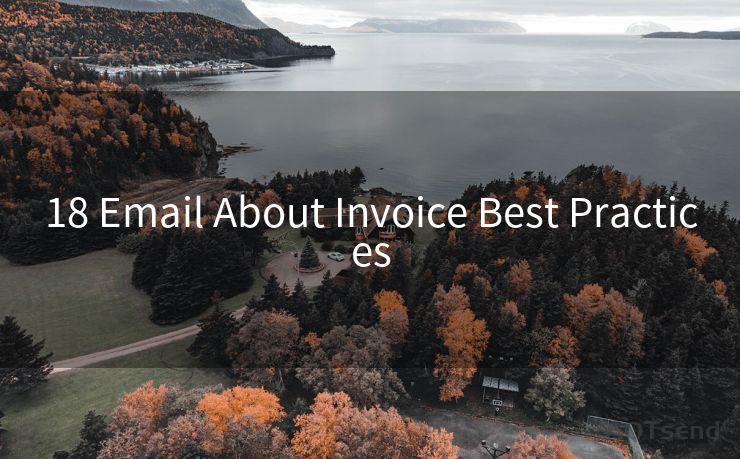18 Email About Invoice Best Practices




When it comes to invoicing, clear and effective communication is key. Emails play a crucial role in this process, ensuring smooth transactions and timely payments. Here are 18 email tips for invoice best practices that will help you streamline your invoicing process and improve your cash flow.
1. Clear Subject Line
Start with a clear and concise subject line that summarizes the content of the email, such as "Invoice #123 for Project XYZ." This helps the recipient understand the email's purpose immediately.
2. Professional Greeting
Always use a professional greeting, addressing the recipient by name if possible. This sets the tone for a formal and respectful communication.
3. Invoice Details
Include all the necessary invoice details in the email body, such as the invoice number, date, total amount, and payment terms. This provides a quick overview for the recipient.
4. Itemized List of Services or Products
Attach a detailed invoice with an itemized list of services or products provided, along with their respective costs. This transparency builds trust and ensures there are no misunderstandings.

5. Payment Instructions
Provide clear payment instructions, including the preferred payment method, payment deadline, and any relevant banking details. Simplify the payment process for your clients as much as possible.
6. Thank You Note
Express gratitude for the business transaction. A simple "thank you" goes a long way in fostering positive business relationships.
7. Contact Information
Include your contact information in case the recipient has any questions or concerns regarding the invoice. This enhances the accessibility and responsiveness of your business.
8. Follow-Up Emails
Send follow-up emails if payment is not received by the due date. Maintain a polite and professional tone, inquiring about the status of the payment.
9. Confirmation of Payment Received
Once payment is received, send a confirmation email acknowledging the receipt. This closes the loop on the transaction and provides peace of mind to the client.
10. Use Templates
Utilize email templates for invoices to ensure consistency and efficiency. Customize the template to suit your brand voice and style.
11. Avoid Spam Filters
Be mindful of spam filters when crafting your emails. Avoid using too many links or attachments, and use a reputable email service provider.
12. Test Emails
Send test emails to yourself or colleagues before sending them to clients. This helps identify any formatting or content issues that may arise.
13. Mobile-Friendly Design
Ensure your emails are mobile-friendly, as many clients may check their emails on the go. A responsive design improves readability and user experience.
14. Archiving and Record-Keeping
Maintain a system for archiving and keeping records of all invoice-related emails. This is crucial for tax purposes and future reference.
15. GDPR Compliance
If you operate in the European Union or handle EU citizens' data, ensure your emails are GDPR-compliant. This includes obtaining consent for data processing and securing personal information.
16. Personalized Approach
While templates are efficient, don't forget to personalize your emails. Addressing specific project details or thanking the client for their business adds a human touch.
🔔🔔🔔
【AOTsend Email API】:AOTsend is a Managed Email Service for sending transactional emails. Support Email Types: reminders, authentication, confirmations, notifications, verification codes, invoices, password resets, account activations, billing statements, two-factor authentication (2FA), and one-time passwords (OTP) emails, etc. $0.28 per 1000 Emails. 99% Delivery, 98% Inbox Rate.
You might be interested in:
Why did we start the AOTsend project, Brand Story?
What is a Managed Email API, How it Works?
Best 25+ Email Marketing Platforms (Authority,Keywords&Traffic Comparison)
Best 24+ Email Marketing Service (Price, Pros&Cons Comparison)
Email APIs vs SMTP: How they Works, Any Difference?
17. Prompt Responses
Respond promptly to any invoice-related inquiries from clients. This demonstrates your commitment to customer service and efficiency.
18. Regular Updates
If there are any changes to your invoicing process or payment terms, notify your clients via email. Keeping them informed reduces confusion and maintains trust.
By following these 18 email tips for invoice best practices, you can streamline your invoicing process, improve cash flow, and foster positive business relationships with your clients. Remember, clear and effective communication is the key to successful invoicing.




Scan the QR code to access on your mobile device.
Copyright notice: This article is published by AotSend. Reproduction requires attribution.
Article Link:https://www.mailwot.com/p4819.html



